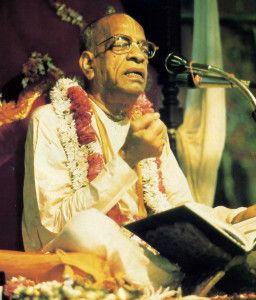Hare Krishna
15th July, 2014. Gurgaon
Q: What are the three paths of advancement for human beings to achieve perfection of life ?
Ans : The three paths are Karma yoga, Jnana yoga and Bhakti Yoga.
Lord Krishna teaches Sri Udhava
SB 11.20.6 — The Supreme Personality of Godhead said: My dear Uddhava, because I desire that human beings may achieve perfection, I have presented three paths of advancement — the path of knowledge, the path of work and the path of devotion. Besides these three there is absolutely no other means of elevation.
SB 11.20.7 — Among these three paths, jñāna-yoga, the path of philosophical speculation, is recommended for those who are disgusted with material life and are thus detached from ordinary, fruitive activities. Those who are not disgusted with material life, having many desires yet to fulfill, should seek perfection through the path of karma-yoga.
SB 11.20.8 — If somehow or other by good fortune one develops faith in hearing and chanting My glories, such a person, being neither disgusted with nor very much attached to material life, should achieve perfection through the path of loving devotion to Me.
Prabhupada’s disciples wrote the below wonderful purport for the above verses, explaining the three paths and their goals.
Ultimately, the goal of philosophical speculation, pious regulated work and devotional service is the same — Kṛṣṇa consciousness. As stated by the Lord in Bhagavad-gītā (4.11):
ye yathā māṁ prapadyante
tāṁs tathaiva bhajāmy aham
mama vartmānuvartante
manuṣyāḥ pārtha sarvaśaḥ
“All of them — as they surrender unto Me — I reward accordingly. Everyone follows My path in all respects, O son of Pṛthā.”
Although all authorized processes of human perfection ultimately lead to Kṛṣṇa consciousness, or love of God, various performers have specific propensities and qualifications and thus gravitate to different methods of self-realization. Lord Kṛṣṇa here describes the three authorized processes together in order to emphasize that their ultimate goal is one. At the same time, philosophical speculation and regulated pious work can never be considered equal to pure love of Godhead, as the Lord has elaborately clarified in the previous chapters. The word trayaḥ, or “three,” indicates that despite their ultimate oneness of purpose, the three paths display diversity in progress and achievement. One cannot achieve the same result by mere speculation or piety that one achieves by directly surrendering to the Personality of Godhead, depending completely on His mercy and friendship. The word karma here indicates work dedicated to the Personality of Godhead. As described in Bhagavad-gītā (3.9):
yajñārthāt karmaṇo ’nyatra
loko ’yaṁ karma-bandhanaḥ
tad-arthaṁ karma kaunteya
mukta-saṅgaḥ samācara
“Work done as a sacrifice for Viṣṇu has to be performed; otherwise work binds one to this material world. Therefore, O son of Kuntī, perform your prescribed duties for His satisfaction, and in that way you will always remain unattached and free from bondage.” In the process of jñāna, one seeks impersonal liberation by merging into the glaring effulgence of the Personality of Godhead. Such liberation is considered hellish by the devotees, because by merging one loses all awareness of the supreme blissful feature of the Lord as Bhagavān, the supreme person. The performers of karma, or regulated work, seek the three aspects of human progress other than liberation — namely religiosity, economic development and sense gratification. The fruitive workers think that by exhausting each of their innumerable material desires they will gradually come out of the dark tunnel of material existence into the clear light of spiritual liberation. This process is very dangerous and uncertain, because not only is there virtually no limit to material desires, but even a slight flaw in the process of regulated work constitutes sin and throws one off the path of progressive life. The devotees directly aim for love of Godhead and are therefore most pleasing to the Supreme Lord. In any case, all three divisions of Vedic elevation depend completely on the mercy of Lord Kṛṣṇa. One cannot progress along any one of these paths without the blessings of the Lord. Other Vedic processes, such as austerity, charity and so forth, are included within the three primary divisions described here.
Those who are frustrated in the ordinary material life of society, friendship and love, and who understand that promotion to heaven simply brings further domestic miseries, take directly to the path of knowledge. Through authorized philosophical discrimination they transcend the bonds of material existence. Those who are still desirous of enjoying material society, friendship and love, and who are excited by the prospect of going with their relatives to material heavenly planets, cannot take directly to the path of rigorous philosophical advancement, which requires great austerity. Such persons are advised to remain in family life and offer the fruits of their work to the Supreme. In this way, they also can become perfect and gradually learn detachment from material life.
A first-class candidate for pure devotional service, on the other hand, is neither completely disgusted with nor attached to material life. He does not desire to pursue ordinary material existence any further, because it cannot award real happiness. Nevertheless, a candidate for devotional service does not give up all hope for perfecting personal existence. A person who avoids the two extremes of material attachment and impersonal reaction to material attachment and who somehow or other gets the association of pure devotees, faithfully hearing their message, is a good candidate for going back home, back to Godhead, as described here by the Lord.
All glories to Śrīmad-Bhāgavatam.
All glories to Sri Guru and Sri Gauranga.


